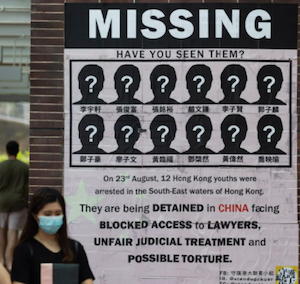The Tapei Times reports
Students at Oxford University specializing in the study of China are being asked to submit some papers anonymously to protect them from the possibility of retribution under the sweeping new security law introduced three months ago in Hong Kong.
The anonymity ruling is to be applied in classes, and group tutorials are to be replaced by one-to-ones. Students are also to be warned that it will be viewed as a disciplinary offence if they tape classes or share them with outside groups.
The Hong Kong National Security Law was imposed on June 30 by Beijing after more than a year of pro-democracy protests, and had an immediately corrosive impact on political freedoms in the territory.
Its provisions also give the Chinese government powers to arrest individuals who are not Hong Kong residents, for actions or comments made outside the territory.
The powerful extraterritorial powers claimed in the law have led to fears for those studying in the UK, in particular for those with personal and family connections to Hong Kong and mainland China.
Universities UK, the vice chancellors’ group, is to hold talks with academics specializing in China to discuss the National Security Law early next month.
A group of academics are also expected to advance a draft code of conduct this week for how universities should deal students from authoritarian states.
The number of Chinese students in UK higher education has grown by more than one-third in the past four years and is now more than 120,000. In 2018 and last year, 35 percent of all non-EU students were from China.
Overseas students are a valuable source of income for the UK university sector since they often pay two to three times as much in fees as UK students.
“The entire spirit of the tutorial, which rests on collective critical inquiry, rises or falls on the ability of the institution to guarantee free speech, freedom of expression and academic freedom for all,” said Patricia Thornton, an associate professor of Chinese politics at Oxford University.
“But how to do this in the wake of China’s new National Security Law for Hong Kong, which invites self-censorship with its lack of red lines and generous extraterritorial provision,” she said.
“How does one protect academic freedom when China claims the right to intervene everywhere?” she said.
“I have decided not to alter the content of my teaching. However, like my colleagues in the US, I am mindful of my duty of care for my students, many of whom are not UK citizens. My students will be submitting and presenting work anonymously in order to afford some extra protection,” she added.
Her students will be asked to read anonymized papers in weekly classes, and small group tutorials will be replaced by one-on-one lessons.
“This means my lectures, reading lists and tutorial essay questions will remain largely the same, but the students will be asked to present the anonymized work of one of their peers in classes,” Thornton said.
She said advice is being issued that if classes are delivered online, there must be no attempt to record the content or share the material with anyone outside the group.
Claiming “we are all Hong Kongers,” she said that the extraterritorial provision arguably makes deportation a possibility.
The decision in Oxford follows similar moves by elite US colleges.
At Princeton University, students in a Chinese politics class will use codes instead of names on their work, and Harvard Business School might excuse students from discussing politically sensitive topics if they are worried about the risks, the Wall Street Journal reported last month.
“Students that come from China to work in our universities come from universities where there are cameras in classes and there are paid informants and narks to tell them what is going on. We have to be very very careful that does not leak into our universities,” University of Oxford chancellor and former Hong Kong governor Chris Patten said.
“Hong Kong represents all those values that China is nervous about — whether it is free speech, a recognition of the universality of human rights, the determination to provide an education that is open,” said Patten, a fierce critic of the Chinese Communist Party.
Eva Pils, a professor of law at King’s College London, said: “There is a great deal of concern about the new national security legislation in Hong Kong and its impact on freedom of expression.”
“The offences newly introduced by this law are worded vaguely, leading to the fear that any criticism of the government could be treated as a criminal offence… There is also the risk that an individual’s case can be transferred to the mainland where the legal process is deeply flawed,” Pils said.
“If you are a student or scholar visiting, for example, the UK from Hong Kong or planning to visit Hong Kong and you work on issues perceived as politically sensitive in Hong Kong, then you have some reason to be worried that your work might get you into trouble, and that is what is happening. The effect can be stifling and oppressive, also in the classroom,” she said.
The British Association for Chinese Studies has warned universities that the response to the security law “cannot be for teachers to err on the side of caution in their teaching content or for certain China-related modules to be dropped from the syllabus because they prove too challenging to deliver safely.”
Source: https://www.taipeitimes.com/News/world/archives/2020/09/29/2003744286




